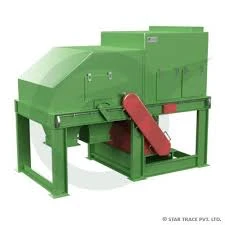
9 月 . 25, 2024 19:36 Back to list
Metal Recycling Plants A Pillar of Sustainable Development
In the era of rapid industrialization and urbanization, the demand for metals has surged, leading to immense pressure on natural resources. However, metal recycling plants have emerged as a crucial solution in addressing the environmental challenges associated with metal consumption. These facilities not only help in conserving natural resources but also play a pivotal role in reducing pollution, saving energy, and fostering economic growth.
Metal recycling involves the process of collecting scrap metal and reprocessing it into new products. This process typically begins with the collection of scrap from various sources, including construction sites, manufacturing industries, and public donations. Once collected, the metal is sorted, cleaned, and shredded for further processing. Advanced technologies and sorting techniques are employed to ensure maximum recovery of different metal types, including aluminum, copper, steel, and brass, as each metal has its specific market value and applications.
One of the most significant advantages of metal recycling is its potential to conserve natural resources. The extraction of raw metals from the earth is not only resource-intensive but also environmentally damaging. Mining operations often lead to deforestation, loss of biodiversity, and soil erosion. In contrast, recycling metal significantly reduces the need for mining new materials. For instance, recycling aluminum saves up to 95% of the energy required for producing new aluminum from raw ore, making it one of the most energy-efficient recycling processes.

In addition to conserving resources, metal recycling also helps in reducing greenhouse gas emissions. The production of metals from virgin ore is responsible for a significant percentage of global carbon emissions. By contrast, recycling metals requires substantially less energy, leading to a lower carbon footprint. According to the Environmental Protection Agency (EPA), recycling steel saves approximately 2,500 pounds of iron ore, 1,400 pounds of coal, and 120 pounds of limestone for every ton of steel recycled. This not only mitigates climate change but also contributes to cleaner air and water.
Economic benefits also abound with the proliferation of metal recycling plants. These facilities create job opportunities and stimulate local economies. The recycling industry has seen exponential growth over the past few decades, driven by increasing awareness of sustainable practices and the rising market demand for recyclable materials. From collection to processing and distribution, the entire recycling chain provides jobs for thousands of individuals. Furthermore, by reducing the costs associated with raw material procurement, businesses in various sectors can enhance their profitability while contributing to environmental preservation.
However, the success of metal recycling plants is contingent upon public participation and effective regulatory frameworks. Raising awareness about the importance of recycling metal is key to increasing the volume of scrap collected. Community programs and incentives can encourage individuals and businesses to actively participate in recycling efforts. Moreover, robust regulations are needed to ensure that recycling processes adhere to environmental standards, preventing potential hazards associated with improper handling of scrap materials.
In conclusion, metal recycling plants are instrumental in promoting sustainable development. By conserving natural resources, reducing greenhouse gas emissions, and supporting economic growth, these facilities are vital for creating a more sustainable future. As society becomes increasingly aware of the environmental ramifications of its consumption patterns, the role of metal recycling is expected to expand. The continued investment in and development of metal recycling technologies will further enhance efficiency and effectiveness, paving the way for a circular economy where materials are reused, repurposed, and recycled. It is imperative that individuals, businesses, and governments work together to bolster the recycling movement, ensuring that the benefits of metal recycling are realized for generations to come.
Latest news
Unveiling the Power of Eddy Current Separator
NewsSep.25,2024
Transform Your Home Recyclin:home metal shredder
NewsSep.25,2024
The Future of Waste Management with Recycling Line Picker
NewsSep.25,2024
The Benefits of a Metal Recycling Plant
NewsSep.25,2024
Revolutionize Material Separation with Onwang Technology
NewsSep.25,2024
Innovative Waste Management: Unveiling the MSW Sorting Plant
NewsSep.25,2024